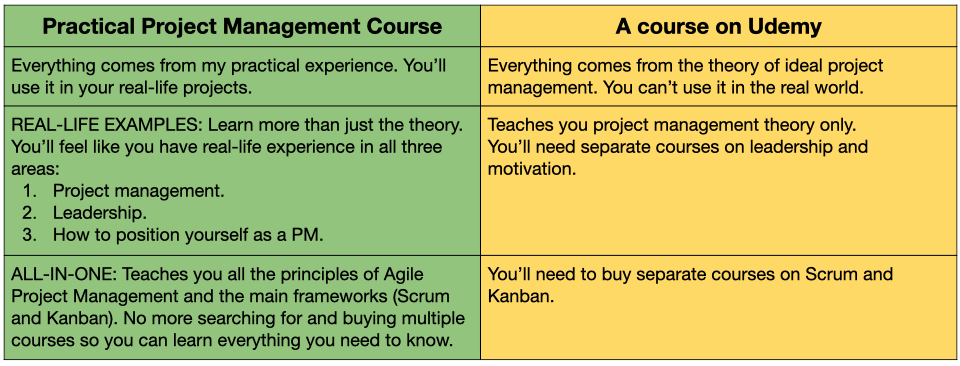
Project managers must be able to manage complex tasks. He or she must also be able resolve conflicts. Furthermore, he or she should have the skills to negotiate with functional managers for crucial skills. These skills will be a great asset to the project manager. It isn't easy to learn them. Here are a few skills that every project manager should have. These are the skills that every project manager should have:
Time management
Project management is a skill that requires good time management. These skills include delegating and assessing the work of team members, planning and prioritizing the work, estimating customer needs, and communicating with management. Project managers must be able to adjust their approach to meet deadlines. They need to understand the needs of every stakeholder and team member. This can be a daunting task, but good time management skills can help them to effectively manage their time.

Leadership
For project managers to succeed, they must possess five core leadership skills. These skills include inspiring others and creating a team culture. They also include effective communication skills and negotiation skills. Additionally, leaders who excel in leading others use strategies that strengthen relationships and focus on performance. These skills are easily developed. We will be discussing some of the most essential ones and how you might develop these skills in this article.
Communication
Effective communication skills are the foundation of a successful project manager's role. To improve their communication skills, project managers should understand different types of communication. They should be able to present information in an appropriate format to all audience members. This includes allowing team members freedom to voice their concerns and opinions without having to censor them. It will also strengthen their leadership skills and help them achieve the goals of the project. These tips will help you improve communication skills.
Problem-solving
The best project managers use a systematic approach when solving problems. This approach identifies five key steps that lead to effective problem-solving. The first step in solving a problem is to define it. It is crucial to define the problem accurately so that you can find the best solution. Next, you need to find the solution. This is the most important step. Understanding the current situation of your project is essential in order to find the best solution.

Motivation
One of your core competencies as a project manager is your ability to motivate your team. Motivation is defined simply as the "willingness or ability to act," so a project manager must be able understand these forces in order influence positively. It is crucial to listen to the needs of your team members and to not force them to share their personal opinions. A good project manager can motivate his or her team through positive reinforcement.
FAQ
How does a manager motivate his/her employees?
Motivation can be defined as the desire to achieve success.
Enjoyable activities can motivate you.
You can also feel motivated by making a positive contribution to the success in the organization.
For example: If you want to be a doctor, you might find it more motivating seeing patients than reading medical books all day.
Another source of motivation is within.
For example, you might have a strong sense of responsibility to help others.
Maybe you like working hard.
Ask yourself why you feel so motivated.
You can then think of ways to improve your motivation.
What are the 5 management processes?
Each business has five stages: planning, execution and monitoring.
Planning means setting goals for the long-term. Planning includes setting goals for the future.
Execution is when you actually execute the plans. These plans must be adhered to by everyone.
Monitoring is a way to track progress towards your objectives. Monitoring should include regular reviews of performance against goals and budgets.
Review events take place at each year's end. They provide an opportunity to assess whether everything went well during the year. If not then, you can make changes to improve your performance next year.
Evaluation takes place after the annual review. It helps you identify the successes and failures. It also gives feedback on how well people did.
What role does a manager play in a company?
The role of a manager varies from one industry to another.
A manager is generally responsible for overseeing the day to day operations of a company.
He/she makes sure that the company meets its financial obligations, and that it produces goods or services that customers desire.
He/she makes sure that employees adhere to the rules and regulations as well as quality standards.
He/she plans and oversees marketing campaigns.
How does a manager develop his/her management skills?
Good management skills are essential for success.
Managers should monitor the performance and progress of their subordinates.
You must act quickly if you notice that your subordinate isn’t performing to their standards.
You must be able to spot what is lacking and how you can improve it.
Statistics
- Hire the top business lawyers and save up to 60% on legal fees (upcounsel.com)
- As of 2020, personal bankers or tellers make an average of $32,620 per year, according to the BLS. (wgu.edu)
- 100% of the courses are offered online, and no campus visits are required — a big time-saver for you. (online.uc.edu)
- The profession is expected to grow 7% by 2028, a bit faster than the national average. (wgu.edu)
- UpCounsel accepts only the top 5 percent of lawyers on its site. (upcounsel.com)
External Links
How To
How can you create a Quality Management Plan, (QMP)?
Quality Management Plan (QMP), which was introduced in ISO 9001:2008, provides a systematic approach to improving processes, products, and services through continual improvement. It emphasizes on how to continuously measure, analyze, control, and improve processes, product/service, and customer satisfaction.
QMP stands for Quality Management Process. It is used to guarantee good business performance. QMP helps improve production, service delivery and customer relationships. QMPs must include all three elements - Products, Services, and Processes. The QMP that only addresses one aspect of the process is called a Process QMP. The QMP that focuses on a Product/Service is called a "Product." QMP. QMP stands for Customer Relationships.
Scope, Strategy and the Implementation of a QMP are the two major elements. These elements are as follows:
Scope: This is the scope of the QMP and its duration. This scope can be used to determine activities for the first six-months of implementation of a QMP in your company.
Strategy: This describes the steps taken towards achieving the goals set forth in the scope.
A typical QMP has five phases: Planning (Design, Development), Implementation (Implementation), and Maintenance. Below is a description of each phase:
Planning: In this stage the QMP's objectives and priorities are established. Every stakeholder involved in the project is consulted to determine their expectations and needs. Once the objectives and priorities have been identified, it is time to plan the strategy to achieve them.
Design: In this stage, the design team designs the vision and mission, strategies, as well as the tactics that will be required to successfully implement the QMP. These strategies are then put into practice by creating detailed plans.
Development: Here, the development team works towards building the necessary capabilities and resources to support the implementation of the QMP successfully.
Implementation: This is the actual implementation and use of the QMP's planned strategies.
Maintenance: It is an ongoing process that maintains the QMP over time.
The QMP must also include several other items:
Stakeholder involvement is important for the QMP's success. They should be involved in planning, design, development and implementation of the QMP.
Project Initiation. It is important to understand the problem and the solution in order to initiate any project. The initiator must know the reason they are doing something and the expected outcome.
Time Frame: The time frame of the QMP is very critical. The simplest version can be used if the QMP is only being implemented for a short time. For a long-term commitment you may need more complicated versions.
Cost Estimation is another important aspect of the QMP. You can't plan without knowing how much money it will cost. Before you start the QMP, it is important to estimate your costs.
QMPs are more than just documents. They can also be updated as needed. It changes as the company grows. It is important to review it periodically to ensure it meets all current requirements.